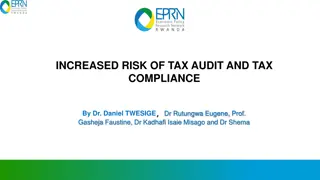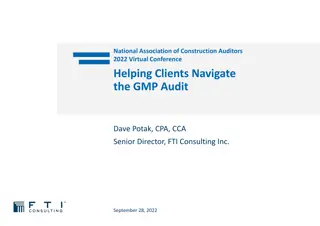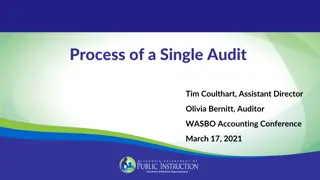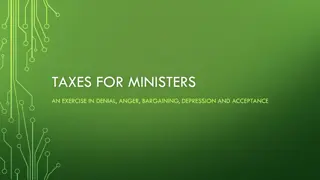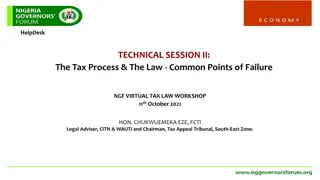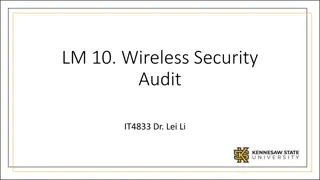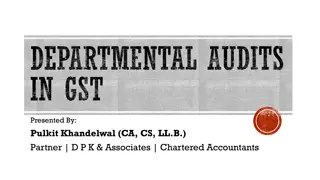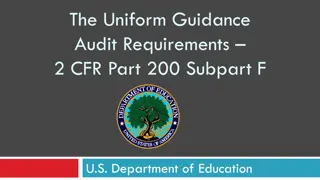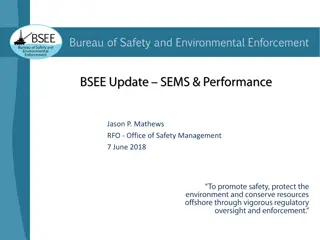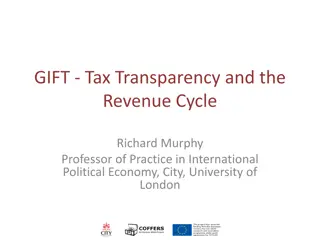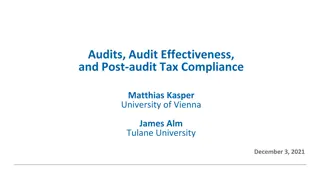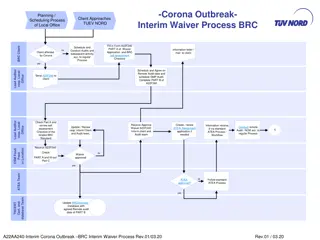Impact of Audits on Tax Compliance: Insights from Research Studies
Studies conducted by researchers such as Erich Kirchler have explored the impact of audits on tax compliance. While audits generally have a positive effect on compliance, there are cases where they can backfire, leading to unintended consequences. High auditing levels may not always deter tax evasion effectively, as untargeted audits can breed distrust among compliant taxpayers. These findings highlight the complexities of enforcement strategies in addressing tax evasion.
Download Presentation

Please find below an Image/Link to download the presentation.
The content on the website is provided AS IS for your information and personal use only. It may not be sold, licensed, or shared on other websites without obtaining consent from the author.If you encounter any issues during the download, it is possible that the publisher has removed the file from their server.
You are allowed to download the files provided on this website for personal or commercial use, subject to the condition that they are used lawfully. All files are the property of their respective owners.
The content on the website is provided AS IS for your information and personal use only. It may not be sold, licensed, or shared on other websites without obtaining consent from the author.
E N D
Presentation Transcript
Command, Control and Punish! Impact of Audits on Future Compliance Erich Kirchler University of Vienna & IHS, Austria 5thInternational Conference on Taxpayer Rights 26-28 May 2021- Athens, Greece S curit & Libert Journal du Siecle (retrieved 201) https://www.google.at/search?q=journal+du+siecle+liberte&biw=1366&bih=673&site=webhp&source=lnms&tbm=isch&sa=X&ved=0ahUKEwia27X225rKAhXHEywKHSKZA_wQ_AUIBigB#tbm=isch&q=journal+du+siecle+liberte+securite&imgrc=ASgOUoj_gogEDM%3A
Income tax evasion Audit Fine Enforcement generally has a strong, positive effect on tax compliance. however, backfiring effects are possible! Allingham, M. G. & Sandmo, A. (1972). Income tax evasion: A theoretical Analysis. Journal of Public Economics 1 (1972) 323-338. Lederman, L. (2016). To what extent does enforcement crowd out voluntary tax compliance? Working draft December 1, 2016.
Audits in the field Lab experiments have shown that audits impact on compliance, however, there are possible drawbacks. (1) Backfiring of audits Juan P. Mendoza, Jacco L. Wielhouwer & Erich Kirchler, 2016 - http://papers.ssrn.com/sol3/papers.cfm?abstract_id=2597479 (2) IRS audit impact study Sebastian Beer, Matthias Kasper, Erich Kirchler & Brian Erard, 2015 http://www.taxpayeradvocate.irs.gov/Media/Default/Documents/2015ARC/ ARC15_Volume2_3- AuditImpact.pdf
Backfiring of audits Country level analysis Associations between auditing level and each compliance indicator (N=260) Tax evasion (predicted values) Auditing level To examine the non-linear association, auditing level is mean-centered and its square is incorporated into the analysis. In line with prior cross-country in- vestigations (e.g., Hail et al., 2015), a fixed effects model with robust standard errors (clustered by country) was applied. This allows to control for structural (time-invariant) country characteristics (Kezdi, 2003), and generate standard errors that are robust to both heteroskedasticity and intra-group (cross-country) correlation (Stock &Watson, 2008; Perez-Truglia, 2009).
Conclusion An elevated auditing level has a backfiring effect on tax evasion (or: high evasion leads to increased audits?). The backfiring effect on evasion could be due to taxpayers untargeted auditing, leading to perception of distrust among compliant taxpayers (too few audits do not reach out to non-compliant taxpayers; too many audits do not discriminate between cooperative and free-riding taxpayers.
TAS (IRS): Audit impact study Sebastian Beer, Matthias Kasper, Erich Kirchler & Brian Erard, 2015 http://www.taxpayeradvocate.irs.gov/Media/Default/Docum ents/2015ARC/ ARC15_Volume2_3-AuditImpact.pdf
Results In the aggregate, taxable income increases by roughly 10% one year after the audit (2% after 3 years). While taxpayers with an additional tax adjustment increased their reported income by around 64% one year after the audit (44% after 3 years), taxpayers with no additional adjustment reported around 15% less income the year after they were audited (21% after 3 years).
Explanations Negative impact potentially driven by various dynamics Regresssion to the mean effect. Overcompliant taxpayers may found out that they overreported in the past. Audits provide new information to taxpayers (p of audits and detection). Audits may be ineffective in detecting non-compliance, and thus, taxpayers may become even more non-compliant in subsequent years. Taxpayers may infer that the risk of a future examination is low given that no adjustments were made (bomb crater effect) Audits as signals of distrust: Interaction climate might be affected by harsh auditing procedures vs audits as instruction & compliant taxpayers may feel like a chump for complying, may feel penalized and find audits a waste of resources. 8
Australian Taxation Office Compliance Model and Motivational Postures (adapted from Braithwaite, 2003b, p. 3, James et al., 2003) Prosecution Prosecution Game-playing Command regulation (non- discretionary; use full force of the law) Disengagement Command regulation (discretionary; deter by detection) Resistance Audit with/ without penalty Enforced self-regulation (help to comply) Capitulation Real time business examinations, record keeping reviews Education Commitment Self-regulation (make compliance easy) Education, record keeping, Service delivery (convenience, access, choice, control MOTIVATIONAL POSTURE REGULATORY STRATEGIES ENFORCEMENT STRATEGIES
What Influence do IRS Audits have on Taxpayer Attitudes and Perceptions? Evidence from a National Survey TAS Annual Report to Congress 2018 Brian Erard, Matthias Kasper, Erich Kirchler & Jerome Olsen https://taxpayeradvocate.irs.gov/Media/Default/Documents/2 018-ARC/ARC18_Volume2.pdf 10
TAS Annual Report 2017 and 2018 (US - Survey) Survey scales (Slippery slope framework) Description Audit probability Detection probability Fines Tax knowledge Attitudes Motivation Perceived audit probability Perceived probability of detection of evasion Perceived severity of fines for noncompliance Subjective competence when filing taxes General attitude towards paying taxes Subjective motivation to comply (obligation vs. contribution to society) Justice Procedural justice Informational justice Interpersonal justice Distributive justice Social norms Coercive power Legitimate power Trust Emotions Fear Anger Caution Threat Protection Enforced compliance Voluntary compliance Thought about cheating Perceived justice in IRS procedures (e.g. audit, ID theft) Perceived transparency in communications with IRS Perceived fairness of treatment by IRS employees Perceived fairness of outcomes of IRS procedures (e.g. audit, ID theft) Perceived compliance levels of other taxpayers IRS enforcement capacity Legitimacy of enforcement Trust in the IRS Fear of the IRS Anger on the IRS Feeling cautious regarding the IRS Feeling threatened by the IRS Feeling protected by the IRS Compliance out of fear for punishment Compliance out of moral obligation Have taxpayers thought about cheating?
Emotions by condition (sample split at centiles 33 and 66) High trust Low power High trust High power Low trust Low power Low trust High power Fear Anger Caution Threat Security/ Protection Scale 1-9 Brian et al. (2019) N = 1317 scedule C taxpayers
Legitimate and (perceived) professional power & trust (interaction climate) Coercive power (audits and harsh fines) Not targeted Targeted Decrease of legitimate power Increase of legitimate power Decrease of reason-based trust Increase of reason-based trust Protection/ security Attention/ prudence Fear Anger Hiding/ avoidance/ enforced compliance Avoidance and (risky) rational decision: non-compliance or enforced compliance Voluntary compliance 13
Conclusion To protect honest taxpayers from free riders, fines are necessary at an adequate level and in the proper form (depending on taxpayers ability to pay) controls are necessary, in form of education service targeted audits and punishment
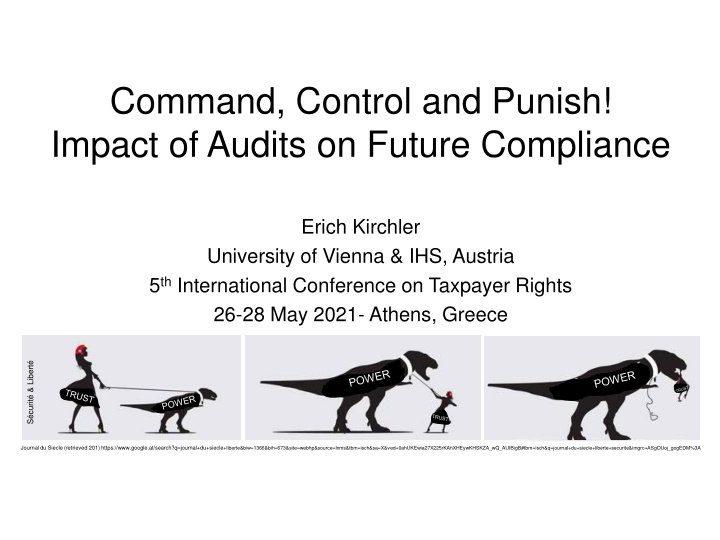


![Town of [Town Name] Real Estate Tax Rates and FY 2024 Budget Summary](/thumb/62211/town-of-town-name-real-estate-tax-rates-and-fy-2024-budget-summary.jpg)
